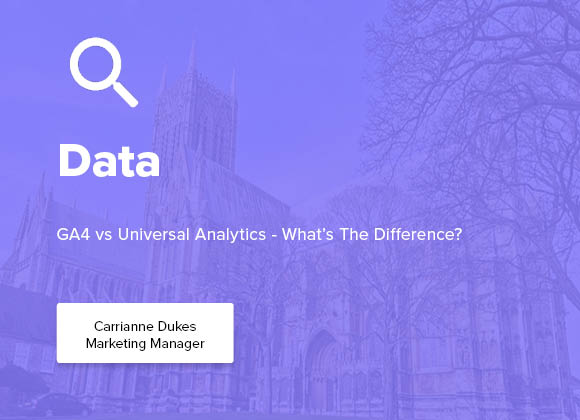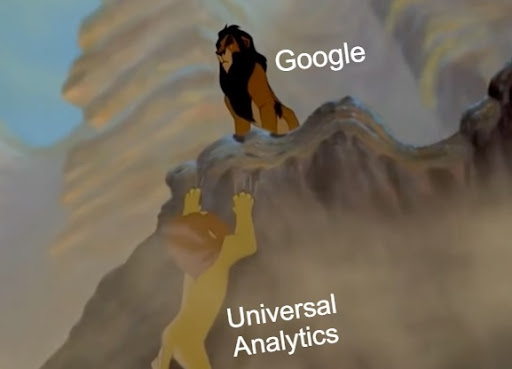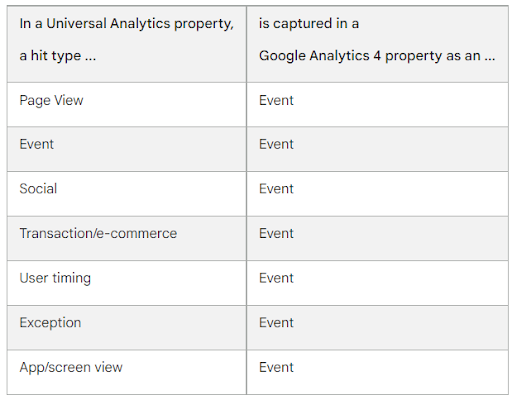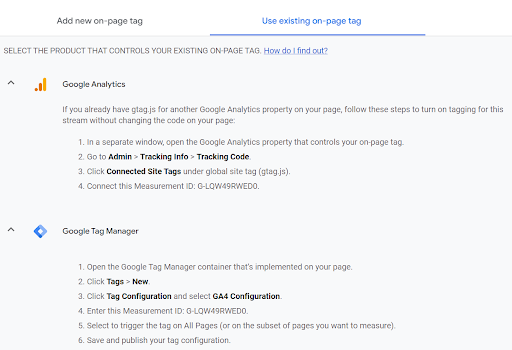Sometimes I love Google. Especially when it tells me that Wagamama is open. But, a lot of the time, it gives me a headache. Why? The constant PPC, SEO and website updates. Google has already started adding spice to 2022 and it’s not even May. Have you heard the latest news to hit the headlines?
“Why it’s more important than ever to make the switch to GA4” – The Drum
“Move from Universal Analytics to GA4 Now!” – Accuracast
Jeeeeeeeeeeeesus. Calm down journalists. We have time. Companies have time. Let’s take a breather for a minute.
Google has announced that they are killing Universal Analytics (UA). Stone cold murderers.
From July 2023, Universal Analytics will be abolished from Pride Rock (the internet). Therefore, it’s so important that marketers understand GA4 to understand the data and make the right decisions for their business.
Google Analytics 4 (GA4) in all its glory
Say hello to the next generation of Google Analytics, GA4. While GA4 has been around for a while, the impending ending of UA has brought it to the surface. *internal scream*. GA4 is a property type that combines App and website data.
GA4 reduces the reliance on cookies and with the emergence of cookieless marketing and privacy updates this brings a humongous sigh of relief. Google will use machine learning to fill in the gaps when people don’t consent to using cookies on your website. It will showcase the user journey instead of splitting users into sessions, devices or platforms, showing a true holistic picture of the user experience on your website.
GA4 is built for the future, for the marketer to make killer business decisions.
“Because the technology landscape continues to evolve, the new Analytics is designed to adapt to a future with or without cookies or identifiers. It uses a flexible approach to measurement, and in the future, will include modelling to fill in the gaps where the data may be incomplete“
Vidhya Srinivasan, VP/GM of Advertising at Google
The difference between GA4 and UA
The reporting. Universal Analytics collects and reports on data using a session-based model, whereas GA4 uses an event-based model. Another big difference, due to the increase in focus on privacy, GA4 will not store the user’s IP address.
Data from your website and App are now all available to view in one property – how fabulous is that?
Events in GA4 are grouped into four categories:
- Automatically collected events – these are automatically collected when you install the code. Page view, first visit and session start.
- Enhanced measurement events – these are automatically recorded when you install the code but include scrolls, clicks (outbound), site search and video engagement. Oh and you can enable and disable these depending on your website’s functionality.
- Recommended events – Google recommends that you set up these eCommerce events on GA4
- Custom events – current maximum of 500. They are custom events and parameters that you can create and implement yourself depending on your website’s requirements.
There’s a big difference between how the hits are recorded, you can see the differences below:
The sooner you change to GA4 the better. Take your time to immerse yourself in the data to understand it fully and make the best decisions for your eCommerce business.
So, how do you do that? Read below lil mutton chop.
Universal Analytics can easily be upgraded to GA4.
…says the least technical ginger in the world.
When you log into Google Analytics, it will tell you to add GA4 as a property type at the top of the page. Click those buttons and then go to tagging instructions. What happens next depends on whether or not you have a gtag.js tag on your page or not.
Follow the instructions below:
Google Tag Manager is the easiest and quickest way to add the GA4 property and that’s what we suggest here at eComOne.
As I hope this blog has shown you, GA4 is a great update to enter the world of eCommerce. It will allow you to see the holistic user experience on your website. Remember, don’t panic. You have time. Universal Analytics isn’t going away tomorrow. You have a fair few more hours to make the change and understand the platform to make the best decisions for your business.
Time to get analysing!
We are Data Feed eCommerce growth specialists that work with mid-sized online businesses to increase their sales from SEO and PPC Advertising. If you want a free PPC or website audit, get in contact with us today. A humanistic and transparent agency that works with our clients to grow their business.







